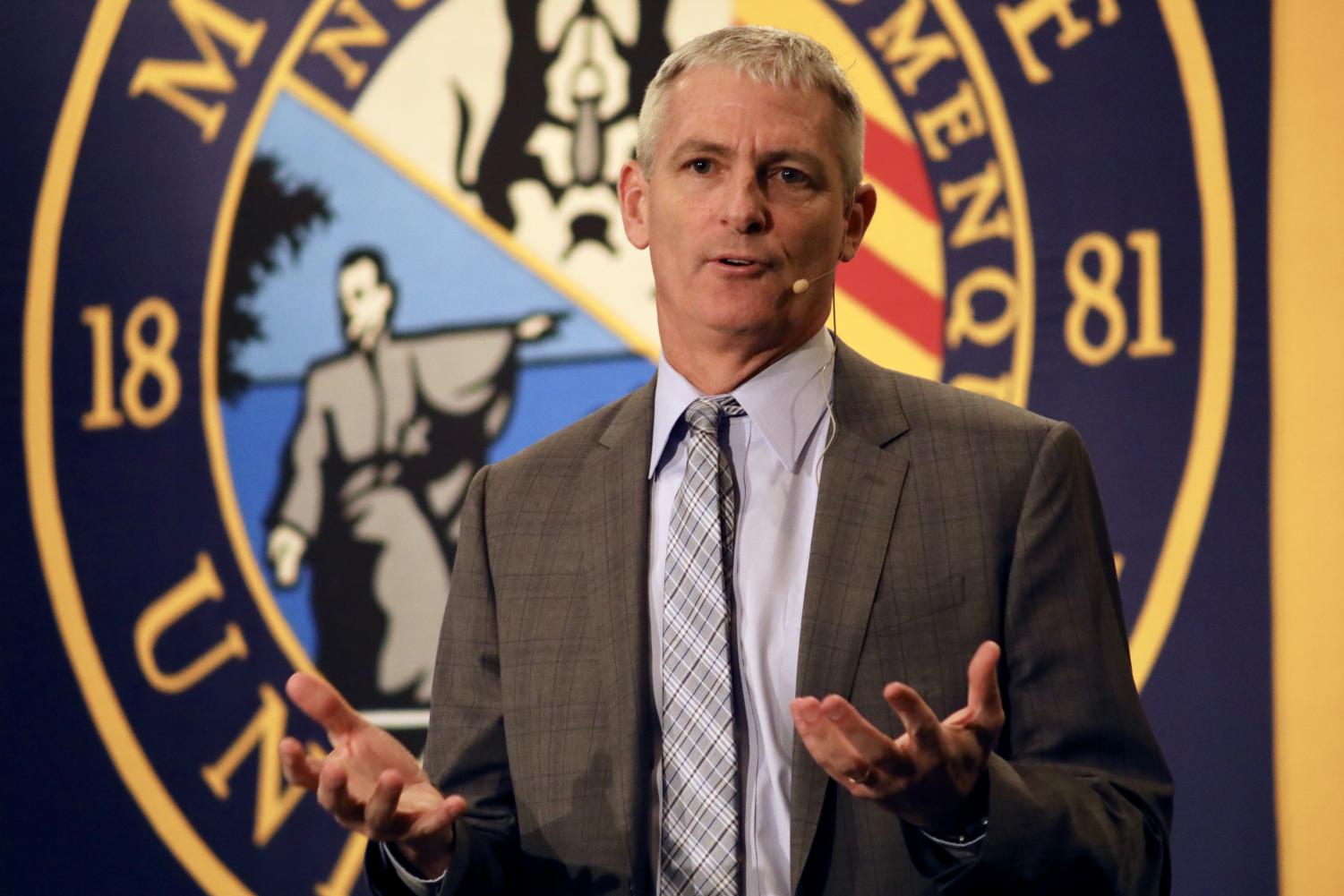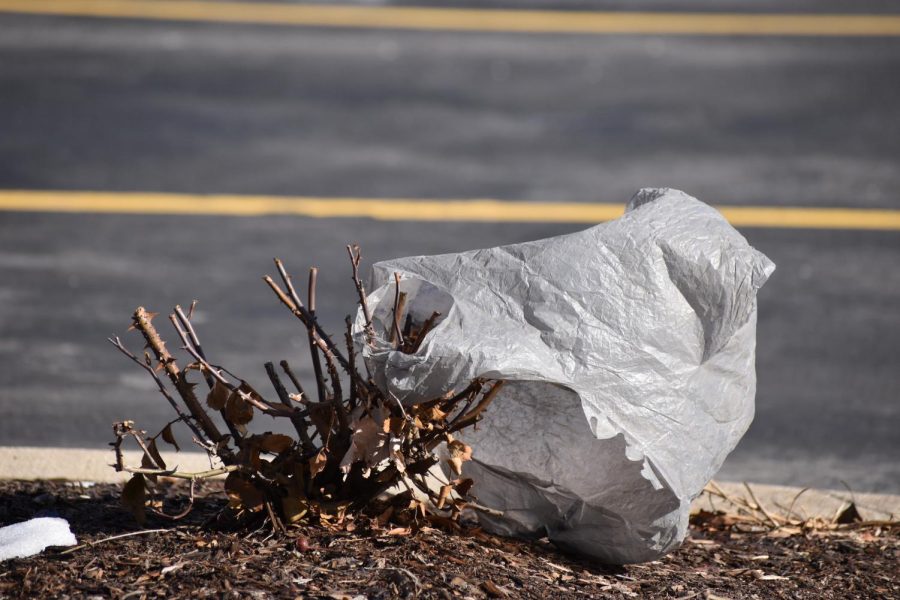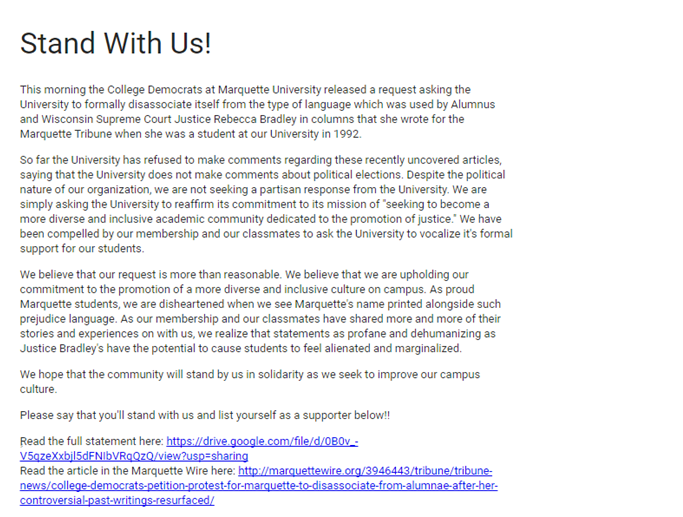Marquette University announced a 3.75% undergraduate tuition increase from $43,350 to $44,970 for the 2020-’21 academic year, according to Monday’s university news release.
“At Marquette, we understand that there are few concerns more pressing across the entire higher education landscape than access and affordability,” the news release said. “For Marquette to stay true to its Catholic, Jesuit mission, we know we cannot continue to increase tuition at our recent pace. At the same time, we must be mindful of the rising costs associated with the significant resources necessary to deliver a world-class, transformative education.”
The 3.75% increase is down from the previous 5% increase.
“The trustees considered the balance between affordability and rising costs, and conducted a careful analysis of the university’s finances to arrive at a 3.75% increase,” university spokesperson Chris Stolarski said in an email.
Students will also be assessed a $55 per semester technology fee. The fee “will contribute to the purchase, implementation, staffing and support of information technology that directly benefits students and the academic learning environment, beginning at the start of the 2020-2021 academic year,” according to the news release.
When taking into account the annual $110 technology fee, the effective cost increase for undergraduates is 3.99%.
The news release stated that the fee will go toward the D2L learning management system, wireless infrastructure on campus, Wired Office to troubleshoot and repair student-owned PCs, campus computer labs, smart classroom technology, internet connectivity, distance learning capabilities and technology-based security systems.
Marquette undergraduate parents will soon receive a letter from senior leadership sharing that the Board of Trustees has approved the increase, according to the news release.
“We understand that a college education is a significant financial investment for our students, and that many families make sacrifices to send their sons and daughters here,” Stolarski said in an email.
“Marquette is not cheap, and it’s only growing more expensive every year,” Michael Mastri, a first-year student in the College of Arts & Sciences, said. “If the value of education is snuffed out by the cost, that’s when people will turn elsewhere, so it’s up to Marquette to use our money effectively and improve the value and quality of our education.”
Claire Connelly, a sophomore in the College of Engineering, voiced concerns about university transparency.
“It’s pretty sad … especially since new students coming in probably do not know that’s going to be the reality of their tuition increase,” Connelly said.
Stolarski said the Board of Trustees considered many factors when evaluating costs and efficiencies. These include compensation and benefits for faculty and staff, student scholarships in the form of tuition discounts, student support services, facilities services and various required administrative expenses, such as insurance.
Students in graduate or professional programs will receive a letter from senior leadership sharing the following tuition schedules for 2020-21.
Graduate students in the College of Education will experience a $25 per credit increase, and students in the Graduate School and Graduate School of Management will experience a $35 per credit increase, except master’s-level humanities programs in Christian doctrine; English; Languages, Literatures and Cultures; history; theology; and philosophy.
The exception is part of Marquette’s “significant investment” in a “new low tuition, low aid model” beginning in fall 2020 for students in those programs, according to the news release.
Current students in those programs can choose between the previous or new pricing models.
“This new tuition model for graduate humanities programs is a strategic and fiscally responsible way for Marquette to meet realistic market demands and invest in its commitment to the humanities, which are at the heart of our Catholic, Jesuit tradition,” the news release said.
There will also be an annual tuition increase of $1,280 for students in the School of Dentistry and an annual tuition increase of $1,430 for full-time students in the Marquette University Law School.
“Higher education is facing considerable financial headwinds,” Stolarski said in an email. “One of those challenges is the growing cost associated with delivering the highest quality education. According to the Commonfund Higher Education Price Index, inflation for U.S. colleges and universities is forecasted to rise 2.6 percent in fiscal year 2019. Projected inflation for materials and supplies alone in 2019 is 6.5 percent. These rising costs are part of the reason the university made the difficult decision to reduce staff headcount earlier this fall.”
Marquette University Student Government President Sara Manjee said MUSG encourages students to stay tuned regarding a January 2020 informational session with the Office of Finance.
“As representatives of the undergraduate student body, we’re committed to finding ways to break down the communication and information gap between students and university leadership,” Manjee said in an email. “We’re confident that this event will fulfill that commitment to undergraduates.”
“We are keenly aware that tuition increases cannot be the only way to continue to deliver the world-class Catholic, Jesuit education students and families rightfully expect from Marquette,” Stolarski said in an email. “Instead, we are responding with mission-driven innovation and investment for competitive advantage and long-term financial health.”
He said the university will do this through operational initiatives within areas such as enrollment, online growth and student housing, and by diversifying revenue streams such as revenue-sharing programs and external partnerships.
“Initiatives are being prioritized based on whether they align with our mission, whether they fulfill the goals of the strategic plan, how they contribute to our master plan, whether they create a new revenue stream and/or increase operational efficiencies, and whether they contribute to our market competitiveness,” Stolarski said in an email.
This story was written by Alexa Jurado. She can be reached at [email protected].
Kate Hyland contributed to this report.







AP • Mar 7, 2020 at 8:08 am
It’s really sad that in just one generation, Marquette has become completely unaffordable. It’s too bad my children won’t be able to carry on the tradition of a Marquette education like the two generations before them.